|
|
|
Sort Order |
|
|
|
Items / Page
|
|
|
|
|
|
|
| Srl | Item |
| 1 |
ID:
177973
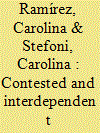

|
|
|
|
|
| Summary/Abstract |
This article examines experiences of making, inhabiting and appropriating space, in relation to the transformations of the political economy in an increasingly multicultural urban setting. Through processes of social production and construction of space, it explores the material, societal and symbolic processes at play. The entry points are memories, images, uses and material connection to Patronato neighbourhood (Santiago, Chile) by people of Korean and Palestinian ancestry. It analyses how claims of space authenticity, processes of ethnicisation and material appropriation of space – commonly understood as given by ‘cultural differences’ – respond to historical, economic and political shifts happening at a global and local level. Moreover, challenging the prism of socioeconomic conflict and separation, it shows emerging dynamics of social interdependence and adjustment, taking place alongside the reorganisation of ethnic boundaries. Such reorganisation allows settled migrants to develop a sense of belonging and control over space in a rapidly changing neoliberal city.
|
|
|
|
|
|
|
|
|
|
|
|
|
|
|
|
| 2 |
ID:
132780
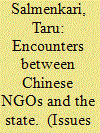

|
|
|
|
|
| Publication |
2014.
|
| Summary/Abstract |
Researchers in the field of Chinese studies often assume that the ability of Chinese NGOs to operate freely increases with their distance from the government, and they classify NGOs accordingly. However, this study suggest that in China distance from the state is not a fixed characteristics of an organization nor is increased distance always an advantage. Even unregistered NGOs adopts various strategies that bring them close to the states. Forthermore, country to common expectations, independence does not guarantee that an NGO will adopt democratic decision-making structure or increase its contacts with ordinary citizens at the grassroots levels.
|
|
|
|
|
|
|
|
|
|
|
|
|
|
|
|
| 3 |
ID:
131544
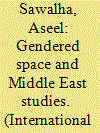

|
|
|
|
|
| Publication |
2014.
|
| Summary/Abstract |
Aspects of space and place shape daily life, social structures, politics, and intimate relations among people. In the late 1980s and 1990s, anthropologists, geographers, and sociologists-influenced by the writings of Michel Foucault and Henri Lefebvre on the meaning of social space-started to highlight the spatial in their analysis of social phenomena. These scholars focused on the production of urban space and asserted that space is dynamic and often shaped by the needs of its users as well as by those who design it. With the exception of Setha Low's work on Latin America, these writings were mostly centered on the United States.
|
|
|
|
|
|
|
|
|
|
|
|
|
|
|
|
| 4 |
ID:
143647
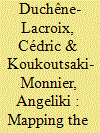

|
|
|
|
|
| Summary/Abstract |
In traditional migration theory, social self-identification is usually linked with the process and quality of integration and with the nationality of the countries of ‘origin’ and of residence. But in the context of a supranational integrated area like the European Union, the self-identification of European people living (also) abroad in another European country can be more complicated. What sorts of identity combinations do they produce in this situation? Could we interpret their choice in the light of their social, economic, cultural capitals and (multi)local integration? Based on an empirical analysis of French citizens in Berlin this article confirms that identity self-combining – not just the identity elements – and the position of the ego in the social space are related. The meaning of the same identity category depends on the respondent’s profiles.
|
|
|
|
|
|
|
|
|
|
|
|
|
|
|
|
| 5 |
ID:
108910
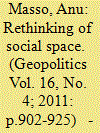

|
|
|
|
|
| Publication |
2011.
|
| Summary/Abstract |
This article analyses the changes in social space, based on perceptions of individuals in a transition country, Estonia. The Marxist approach to social space is used as a theoretical framework. The article originates from the premise that the changes in individuals' conceptual 'apparatus' are needed for keeping up with spatial developments related to capitalism. Analysis of empirical data collected in 2008 focuses on patterns of spatial perceptions of three generations of the two main ethno-linguistic groups in Estonia, the Estonian ethnic majority and the Russian-speaking minority. The results show perception of space is significantly correlated with indices of everyday social and cultural practices and individual wealth and reveal the geographical and ideological division of the world as seen by the inhabitants of a transition country. The article suggests transition has caused spatial disruption particularly amongst the ethnic minority. Increasing ethnic differences from one generation to another infers increasing societal inequality. The quid pro quo relationship between geopolitical changes and economic transition at the individual level is consequently more clearly defined.
|
|
|
|
|
|
|
|
|
|
|
|
|
|
|
|
| 6 |
ID:
109231
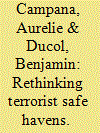

|
|
|
|
|
| Publication |
2011.
|
| Summary/Abstract |
Over the last decade, the term safe haven has stirred controversy both in the political arena as well as in the academic literature. Several authors have emphasised the imprecise and commonly ill-conceived use of this terminology. This article intends to provide a fresh analytical framework to better understand the notion of terrorist safe haven. Rejecting the orthodox state-centric approach that envisions terrorist safe havens solely in their static and territorial dimensions, we focus rather on the social dynamics that characterise these spaces. We contend that although they might appear socially fragmented, these geographical areas are ruled by alternative modes of governance that impose a form of social order regulating interactions among actors. We use the concept of 'social space' to capture the framework in which social interactions between local actors are taking place. While we recognise that the social order that governs a given social space imposes constraints for actors, we contend that it can be subjected to internal contestation, opening a series of opportunities for transnational terrorist networks. We then try to highlight how terrorist groups might take advantage of these internal dynamics and create new ones to ensnare some local actors into forming alliances with them. This article addresses several case studies to further illustrate the theoretical discussion. Finally, we conclude with a discussion of the importance of interpersonal relationships between local and transnational actors. While this article proposes a preliminary analysis of the question, it opens up new research avenues in conceptualising why and how some regions have come to attract transnational terrorist groups.
|
|
|
|
|
|
|
|
|
|
|
|
|
|
|
|
| 7 |
ID:
142538
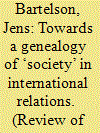

|
|
|
|
|
| Summary/Abstract |
The concept of society and its cognates have long been widely invoked in order to understand International Relations. Theories of international society distinguish between a society of states and a mere system of states, and theories of world society assume that the world constitutes a single social space. In order to come to terms with the social character of International Relations, constructivists of different stripes have invoked a societal context within which the construction of identities and norms takes place. As I shall argue in this article, these usages draw on conceptions of society that emerged during the early phases of modern sociology, and have then been projected onto alien historical and cultural contexts. In order to avoid the anachronism and Eurocentrism that invariably have resulted from these uncritical usages, I argue that academic International Relations should seek to accommodate those forms of human association that cannot be subsumed under a recognisably modern concept of society by incorporating insights from postcolonial sociology into its theoretical core.
|
|
|
|
|
|
|
|
|
|
|
|
|
|
|
|
|
|
|
|
|